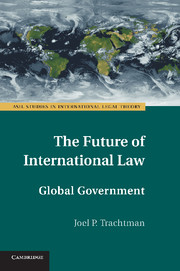Book contents
- The Future of International Law
- Series page
- The Future of International Law
- Copyright page
- Dedication
- Contents
- Preface
- Acknowledgments
- 1 Introduction: The Crisis in International Law
- 2 Reasons for International Law and Organization
- 3 International Law and Organization as a System for Transnational Political Linkage
- 4 The Futurology of International Law
- 5 Cyberspace and Cybersecurity
- 6 Human Rights
- 7 Environmental Protection and Public Health
- 8 Global Regulation of Finance
- 9 Economic Liberalization: Trade, Intellectual Property, Migration, and Investment
- 10 Fragmentation, Synergy, Coherence, and Institutional Choice
- 11 International Legal Constitutionalization
- 12 Conclusion: FunctionalismRevisited
- Index
1 - Introduction: The Crisis in International Law
Published online by Cambridge University Press: 05 March 2013
- The Future of International Law
- Series page
- The Future of International Law
- Copyright page
- Dedication
- Contents
- Preface
- Acknowledgments
- 1 Introduction: The Crisis in International Law
- 2 Reasons for International Law and Organization
- 3 International Law and Organization as a System for Transnational Political Linkage
- 4 The Futurology of International Law
- 5 Cyberspace and Cybersecurity
- 6 Human Rights
- 7 Environmental Protection and Public Health
- 8 Global Regulation of Finance
- 9 Economic Liberalization: Trade, Intellectual Property, Migration, and Investment
- 10 Fragmentation, Synergy, Coherence, and Institutional Choice
- 11 International Legal Constitutionalization
- 12 Conclusion: FunctionalismRevisited
- Index
- Type
- Chapter
- Information
- The Future of International LawGlobal Government, pp. 1 - 21Publisher: Cambridge University PressPrint publication year: 2013

